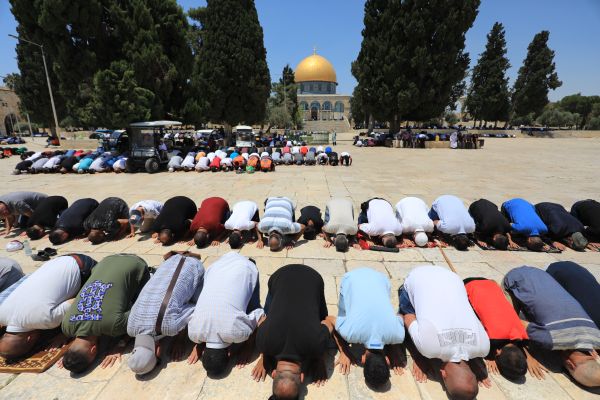Islamist groups want even more Muslims than usual on the Temple Mount during Ramadan.
By Baruch Yedid, TPS
Hamas and other extremist Islamic clerics in eastern Jerusalem are pressuring Jordan to leave the Temple Mount open all night during Ramadan.
The Tazpit Press Service has learned that Islamist groups want additional Muslims on the Temple Mount during the month of Ramadan to counter an expected surge in Jewish visits to the Temple Mount during the overlapping Passover holiday.
The demand is being made in the name of ha’atqaf, an Islamic precept also known as “seclusion” that calls on Muslims to sit and quietly contemplate their relationship with God.
The Islamic holy month of Ramadan begins at sundown on Wednesday night. The week-long holiday of Passover begins at sundown on April 5.
Jordan oversees the Islamic Waqf, a trusteeship which administers the daily affairs of the Temple Mount. In recent years, Jordan has limited the right of ha’atqaf to only the last 10 days of the month to reduce the presence of extremist elements.
Although there are no indications so far that Jordan will change this policy, Islamist pressure on Amman has increased.
A highly informed senior official in eastern Jerusalem told TPS, “Last year, Jordan allowed seclusion at the end of the month and this is in line with Israel, which itself allowed Jews to ascend to the Temple Mount only on days when Jordan prohibited seclusion.”
The Israeli-Jordanian coordination keeps religious frictions down, the source explained.
But extremist elements spearheaded by the Lebanon-based International Al Quds Association demand that seclusion be allowed throughout all the days of Ramadan.
The Association claims that Jews intend to send a surge of visitors the Temple Mount during Passover in the hope of offering sacrifices. The Islamists say that the increased presence of “extremist Jews” and members of Temple organizations on the Temple Mount during Ramadan is also an affront to Islam.
Sheikh Ekrima Sabri, head of the Supreme Muslim Council and former Palestinian Authority-appointed Grand Mufti of Jerusalem told the media, “This year, there is an urgent need to permit the ha’atqaf because the Jerusalem police made the situation in which the right is allowed only in the last 10 days of the month part of the new status quo.”
Hamas also joined the calls for seclusion, saying, “restrictions by the Jerusalem police must be resisted.”
In September, the number of Jews visiting the Temple Mount crossed the 50,000 threshold for the first time in modern history, according to Beyadenu, an organization working to advance Jewish ties to the holy site.
While Judaism is the holiest place in the world for Jews, rabbis are increasingly divided over Jews ascending to the Temple Mount. For centuries, the widespread rabbinic consensus was that the laws of ritual purity still apply to the site. But in recent years, a growing number of rabbis have argued that ritual purity laws don’t apply to all sections of the Temple Mount and encourage visits to permitted areas to maintain Jewish connections to the Mount.
The Temple Mount, where the First and Second Temples were built, is the holiest site in Judaism and Islam’s third-holiest, after Mecca and Medina. The delicate status quo governing it goes back to 1967, when Israel liberated the Old City of Jerusalem from Jordan during the Six Day War.
Fearing a religious war, then-defense minister Moshe Dayan agreed to let the Waqf continue managing the holy site’s day-to-day affairs while Israel would maintain overall sovereignty and be responsible for security. The 1994 Israel-Jordan peace treaty enshrines Jordan’s custodian role over the Temple Mount.
